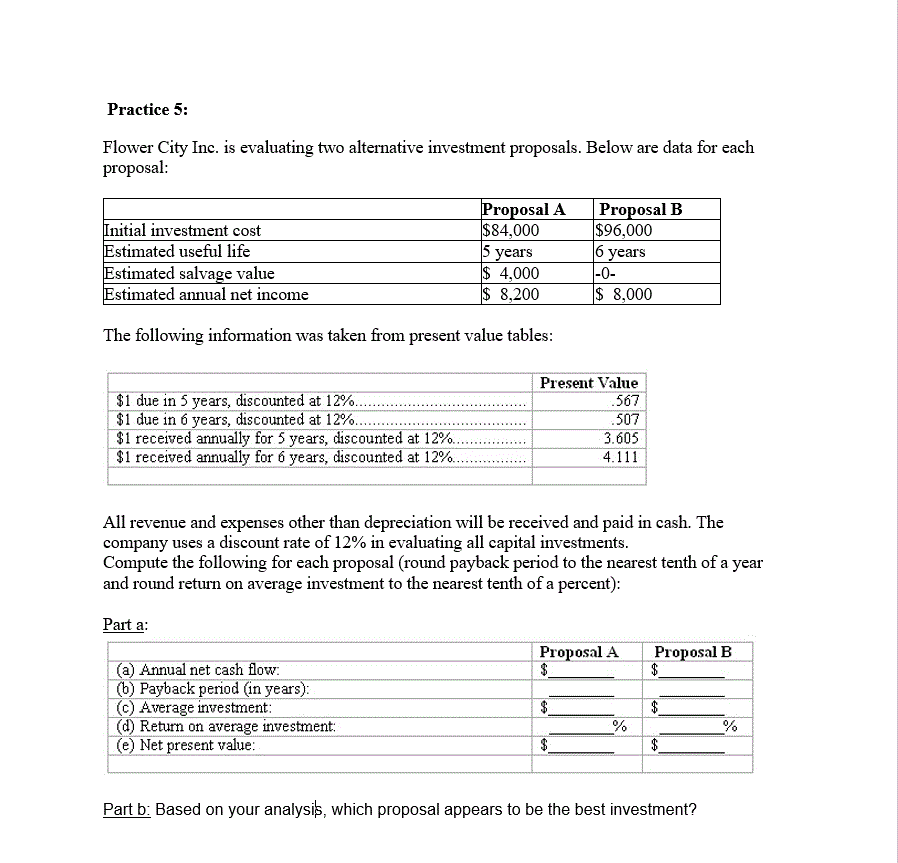
FINANCIAL ACCOUNTING
10th Edition
ISBN: 9781259964947
Author: Libby
Publisher: MCG
expand_more
expand_more
format_list_bulleted
Question
please see attachemnet. There is a part a & oart b in the attached file.

Transcribed Image Text:Practice 5:
Flower City Inc. is evaluating two alternative investment proposals. Below are data for each
proposal:
Proposal A
$84,000
5 years
$ 4,000
8,200
Proposal B
$96,000
6 years
0-
$ 8,000
Initial investment cost
Estimated useful life
Estimated salvage value
Estimated annual net income
The following information was taken from present value tables:
Present Value
$1 due in 5 years, discounted at 12%.. .
$1 due in 6 years, discounted at 12%..
$1 received annually for 5 years, disco
$1 received annually for 6 years, discounted at 12 %.
567
507
3.605
4.111
ted at 12%..
All revenue and expenses other than depreciation will be received and paid in cash. The
company uses a discount rate of 12% in evaluating all capital investments
Compute the following for each proposal (round payback period to the nearest tenth of a year
and round return on average investment to the nearest tenth of a percent)
Part a
Proposal A
$
Proposal B
$
(a) Annual net cash flow
(b) Payback period (in years)
(c) Average investment
(d) Return on average investment:
(e) Net present value:
%
$
$
Part b: Based on your analysis, which proposal appears to be the best investment?
Expert Solution
This question has been solved!
Explore an expertly crafted, step-by-step solution for a thorough understanding of key concepts.
This is a popular solution
Trending nowThis is a popular solution!
Step by stepSolved in 5 steps with 3 images

Knowledge Booster
Learn more about
Need a deep-dive on the concept behind this application? Look no further. Learn more about this topic, accounting and related others by exploring similar questions and additional content below.Similar questions
- Describe the features of JIT.arrow_forwardDefine call protectionarrow_forwardIn the context of databases, what does ACID stand for? A. Automatic, Consistent, Integrated, Durable B. Atomicity, Consistency, Isolation, Durability C. Array, Class, Interface, Data D. Add, Change, Insert, Deletearrow_forward
arrow_back_ios
arrow_forward_ios
Recommended textbooks for you

 AccountingAccountingISBN:9781337272094Author:WARREN, Carl S., Reeve, James M., Duchac, Jonathan E.Publisher:Cengage Learning,
AccountingAccountingISBN:9781337272094Author:WARREN, Carl S., Reeve, James M., Duchac, Jonathan E.Publisher:Cengage Learning, Accounting Information SystemsAccountingISBN:9781337619202Author:Hall, James A.Publisher:Cengage Learning,
Accounting Information SystemsAccountingISBN:9781337619202Author:Hall, James A.Publisher:Cengage Learning, Horngren's Cost Accounting: A Managerial Emphasis...AccountingISBN:9780134475585Author:Srikant M. Datar, Madhav V. RajanPublisher:PEARSON
Horngren's Cost Accounting: A Managerial Emphasis...AccountingISBN:9780134475585Author:Srikant M. Datar, Madhav V. RajanPublisher:PEARSON Intermediate AccountingAccountingISBN:9781259722660Author:J. David Spiceland, Mark W. Nelson, Wayne M ThomasPublisher:McGraw-Hill Education
Intermediate AccountingAccountingISBN:9781259722660Author:J. David Spiceland, Mark W. Nelson, Wayne M ThomasPublisher:McGraw-Hill Education Financial and Managerial AccountingAccountingISBN:9781259726705Author:John J Wild, Ken W. Shaw, Barbara Chiappetta Fundamental Accounting PrinciplesPublisher:McGraw-Hill Education
Financial and Managerial AccountingAccountingISBN:9781259726705Author:John J Wild, Ken W. Shaw, Barbara Chiappetta Fundamental Accounting PrinciplesPublisher:McGraw-Hill Education


Accounting
Accounting
ISBN:9781337272094
Author:WARREN, Carl S., Reeve, James M., Duchac, Jonathan E.
Publisher:Cengage Learning,

Accounting Information Systems
Accounting
ISBN:9781337619202
Author:Hall, James A.
Publisher:Cengage Learning,

Horngren's Cost Accounting: A Managerial Emphasis...
Accounting
ISBN:9780134475585
Author:Srikant M. Datar, Madhav V. Rajan
Publisher:PEARSON

Intermediate Accounting
Accounting
ISBN:9781259722660
Author:J. David Spiceland, Mark W. Nelson, Wayne M Thomas
Publisher:McGraw-Hill Education

Financial and Managerial Accounting
Accounting
ISBN:9781259726705
Author:John J Wild, Ken W. Shaw, Barbara Chiappetta Fundamental Accounting Principles
Publisher:McGraw-Hill Education